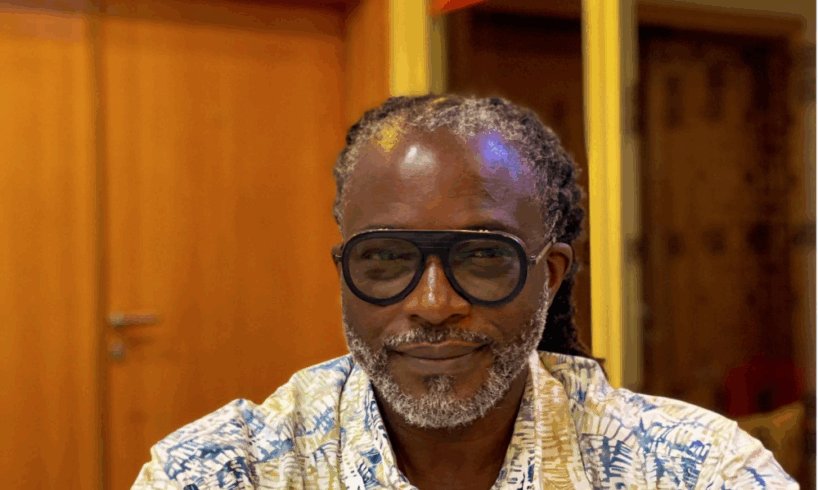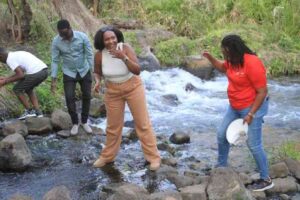
Biyi Bandele
In 2022, I interviewed Biyi Bandele, some days after the release of Blood Sister, Nigeria’s first Netflix Original TV Series, which he directed alongside Kenneth Gyang. In a sudden turn of events, three months after the interview, Biyi Bandele passed away. It was devastating. In the final message to me on WhatsApp, he told me he had just landed at Heathrow Airport and was going to read the interview once he got home. I don’t know whether he got to read it. The publication that initially published the interview went defunct. Rereading the interview recently, I realised the interview maintains relevance.
As previously published:
–
Biyi Bandele called me a child, and we both erupted into boisterous laughter that lasted for about thirty seconds. I never expected our conversation to take that turn, as my prepared questions focused only on his newly directed movie, Blood Sisters, which is regarded Nigeria’s first Netflix Original TV Series. None of my questions was designed to lead Biyi to ask about my age or call me a child.
He called me a child when narrating his experience of trying to meet Wole Soyinka at the University of Ile-Ife (now Obafemi Awolowo University) during his time as a Theatre Arts student. After reading in one of Wole Soyinka’s poetry collections that he was a lecturer there, he applied to the university to meet him. Unfortunately, when he arrived, Wole Soyinka had retired four years earlier. However, he eventually met him six months later. When he mentioned that Wole Soyinka had made a music album—something I had never heard of—I asked, “Wole Soyinka made a music album?” He replied, “Yes, yes. Oh, you didn’t know that? How old are you?” I told him I was 22, and he exclaimed, “Aah, you’re a child!” There was a popular song with the lyrics “If you marry a taxi driver, I don’t care” by Bobby Benson. Wole Soyinka wrote the lyrics to that song.
At 54 years old, Biyi Bandele is writing a book (now published as Yoruba Boy Running). After authoring a couple of books, including Burma Boy, his 2007 novel reviewed by Toby Gould as “a fine achievement” for The Independent, and what summarises Biyi was how he described himself over a phone call from Osogbo to his flat in Lagos when he said “I have been writing all my life” and writing is something he will forever do, whether as a book for the world to read, or as a movie for the world to see.
In this interview, Biyi Bandele ran us through getting his role as the director of Blood Sisters, how he started his journey as a director and his prospects for the Nigerian movie industry, Nollywood.
I would love this interview to be as interactive as possible, because I know I would learn a lot from you as an emerging writer. Can you briefly tell me about your journey as a writer and as a director?
Basically, I’ve been writing all my life. I had my first short story published in a newspaper in Jos called The Sunday Standard because I was born in Kafanchan, which was about a thirty-minute drive from Jos. I knew I wanted to be a writer at a very young age. But I had no interest in directing. I knew I could become a writer because there were mentors. There was Wole Soyinka, there was Chinua Achebe, and all the writers in the African Writers Series whose works I read. So writing was a possibility. I didn’t know any directors. But I saw a lot of films. In Kafanchan, we had a cinema which showed Bollywood, Hong Kong, and Bruce Lee-type movies, which we all loved. And I didn’t see a play in the theatre until I was sixteen or so, when I moved to Lagos. My ancestral home is Abeokuta. I saw a play at the National Theatre and I remember being blown away and really liking it. Then I went to study Theatre at Ife, not because I wanted to be a playwright, but because it was solely mentioned in blurbs of one of Wole Soyinka’s poetry collections that he was a lecturer there. I got there and found out he actually retired four years before I got there. But I met him less than six months after that. Then I moved to the UK, and that was when I started getting interested in films. There were lots of cinemas, video stores in London, and then I wrote a screenplay with Danny Boyle, which he directed, and through him, I got interested in directing. Then I started my apprenticeship, and for like, I kid you not, 10 years, I was watching like four films a day. At some point, I had seen every film in a glass section–and there were thousands of films, you know. Through doing that, I realised what kind of storyteller I was. I started writing screenplays for other people, and at some point, I felt I was ready to direct. Half of a Yellow Sun (from Chimamanda Ngozi Adichie’s Half of a Yellow Sun) was my first feature; it took about seven years for that to happen. And then, when it came out, people tried to destroy it for a number of reasons and bury it. It kind of almost broke me; it was brutal. But I continued working. If I hadn’t done that, I definitely would not have been asked to direct Blood Sisters.
Did you find a way to balance directing with creative writing?
I’m still a writer, and I’m actually writing a book right now. You see, the thing is, I’m Nigerian, and the people I looked up to, whom I didn’t know at that time but knew through their works, were also like that. Wole Soyinka, when I was a kid, you’d hear about him directing a film, he made a music album, played the guitar really well, he was an activist and others. I assume if you are a creative, you should be able to do everything.
On that, can you tell me how you got to direct Blood Sisters?
I met Mo Abudu at a party for Chiwetel Ejiofor, who starred in Half of a Yellow Sun. I knew of her, but we didn’t really know each other. She told me she’s been trying to get in contact with me, and I said, “Really?” She said she’s seen Half of a Yellow Sun and she wants me to get in on something. I told her to send it to me. I got back to London, and a few weeks later, there was a screenplay called 50. A very long script, about 160 pages if I remember correctly. I saw the potential in it, but I felt it was too melodramatic in the worst sense of the word. I said to Mo, “Can we get someone else to rewrite it?” And we got someone to rewrite, which just, simply, didn’t improve on the script that I had, but it increased with new problems. I said to Mo, “I will rewrite this myself.” So based on the materials, I wrote a new screenplay, which was less than 50 pages. It was meant to be a feature, but then I was directing it, and it took us two to three days to shoot. So I continued my work on the right, doing other stuff. And then Mo got in touch in 2020 when I was in New York and asked if I would be interested in directing another project, not Blood Sisters, which got pended because Blood Sisters came along because someone handling it pulled out. I didn’t ask why or who the person was. I think it was South African, I was not even concerned about that. Mo Abudu phoned when I was writing a book in New York on like Friday night and said she needed an answer on whether I would be interested in Blood Sister on Monday. I requested the summary of the story, and I liked it. When they sent me the script, I knew I was going to have fun with it. They had already cast; everything had been done. The only thing left for me was to direct. I gave it my 100 per cent because I had never worked on something like that. Normally, I would develop, write and do the casting, but I didn’t do any of that. It was an opportunity to check myself as a director. It worked out really well.
It worked out pretty well. Blood Sisters is topping charts in North America and even the United States, and other countries
It is actually the number one show on Netflix in the world right now.
You mentioned that they’ve done the casting before you came in, and I am imagining that, as a director, was there a point you felt like a character didn’t align with a role given to them?
Oh yeah, that’s a very good question. The first thrill was that I was going to work with these talented Nollywood actors. When I was introduced to that, I told myself I would make a film, no matter what. Having said that, I’m never going to work like that again. But I didn’t think about it too much because it was a challenge and I wanted to enjoy myself. Once you think about a thing too much, fear enters the equation. So if I had thought about it too much, I would have been afraid to do it.
That’s true. My question on In Blood Sisters would be: there’s the use of voicemail, which we don’t have in Nigeria
We do. We actually do. I’ve never had it, but I know people who have it. But that majority doesn’t have it, doesn’t mean we shouldn’t. We are not only narrating the Nigerian story; we are also creating stories. I mean, when we were directing, I tried to say that, you know, we don’t usually have police rush to a crime scene or have a crime scene thing. We discussed every element. We had police advisors, and they showed us photos. When they want to do things the right way in Nigeria, they do, they just don’t do it most of the time. In VI, I’ve seen police cars chasing someone as we see in Bollywood and American movies. I saw it with my own eyes just two weeks ago.
I also think that a perfect art must not even be exactly perfect
There is no such thing as perfect. You know, you make choices about how you want to criticise, how you want to tell a story, you know.
What do you think about the future of Nollywood? What difference did you notice from the past to the present? What are the prospects you have for the industry through Blood Sisters?
The industry is now full of talented actors like Ramsey Noah, Kate Henshaw and others who are as good as any actors anywhere, of different generations. The joy there for me is just being able to bring those two generations together. I think Nollywood keeps evolving, and it will continue to evolve.
This interview has been edited for brevity and clarity.





